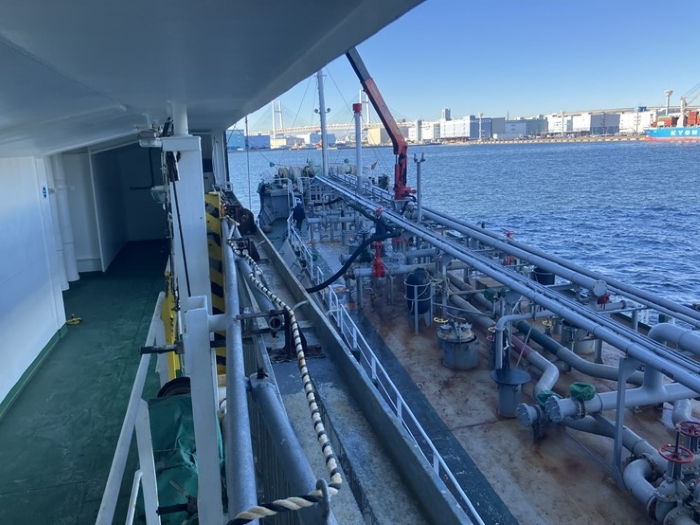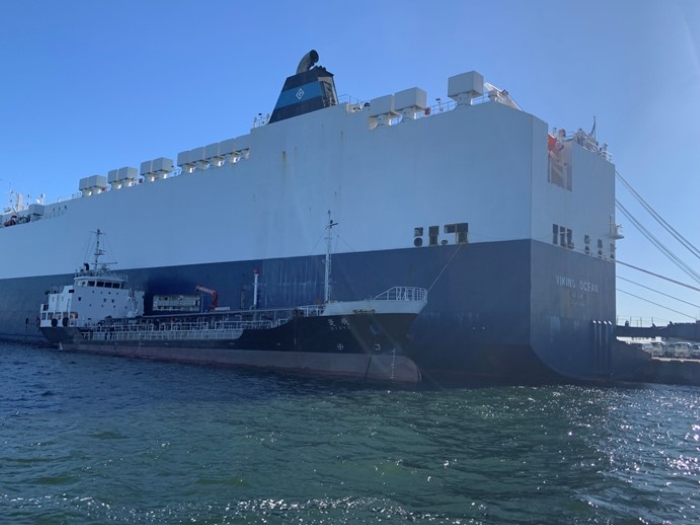A Step Towards a Decarbonised Society, Aiming to Reduce Environmental Impact
On 9 December 2024, Kawasaki Kisen Kaisha, Ltd. (“K”LINE) supplied biofuel to its car carrier vessel, VIKING OCEAN, at the Daikoku C-4 terminal in Yokohama Port. This marks the first instance of “K”LINE using biofuel on one of its own operated vessels within Japan.
The biofuel utilized on this occasion has garnered attention as an alternative energy source capable of reducing environmental impact. It can be used in existing diesel engines without modification, offering a promising substitute for fossil fuels. The fuel contains FAME (fatty acid methyl esters), which is expected to reduce CO2 emissions by approximately 84% over its life cycle, from raw material cultivation to consumption.
(Text by Hirofumi Yamamoto)
Photo courtesy=“K”LINE
For this voyage, VIKING OCEAN was supplied with “B24,” a blend comprising 24% FAME and very low sulfur fuel oil (VLSFO). This is anticipated to achieve a reduction of approximately 190 tonnes of CO2 emissions. Moreover, the biofuel used was produced from feedstocks that do not compete with food or animal feed, enhancing its sustainability credentials.
“K”LINE has already made strides in adopting next-generation technologies, such as liquefied natural gas (LNG)-powered vessels and hybrid systems utilising wind energy. By building its domestic track record with biofuel usage, the company aims to broaden its range of environmentally friendly options.
Implications for the Shipping Industry
As the global drive towards decarbonization accelerates, the shipping industry faces increasing pressure to adopt sustainable fuels and technologies.“K”LINE’s pioneering use of biofuel in its Japanese fleet highlights a new avenue for the industry and represents a significant step for Japan’s maritime sector in aligning with international standards.

川崎汽船、日本で自社運航船に初のバイオ燃料を供給
脱炭素社会に向けた一歩、環境負荷低減を目指す
川崎汽船は2024年12月9日、横浜港の完成車ターミナル「大黒C-4ターミナル」で、自動車専用船「VIKING OCEAN」にバイオ燃料を供給した。日本国内で川崎汽船が自社の運航船にバイオ燃料を使用するのは今回が初めてとなる。
今回使用されたバイオ燃料は、環境負荷を低減できる代替燃料として注目されている。既存のディーゼルエンジンを改造することなく使用可能であり、化石燃料に代わる選択肢として期待されている。この燃料にはFAME(脂肪酸メチルエステル)が含まれており、原料の栽培から燃料の利用に至るライフサイクル全体で約84%のCO2削減が見込まれる。
「VIKING OCEAN」には、FAMEを24%混合した低硫黄燃料油(VLSFO)「B24」が供給された。この航海では約190トンのCO2削減効果が見込まれるという。さらに、今回使用されたバイオ燃料は食料や飼料と競合しない原料を用いて製造されており、持続可能性の観点からも優れた選択肢だ。
同社はすでに、液化天然ガス(LNG)燃料船や風力発電を活用したハイブリッドシステムなど、次世代技術の導入に取り組んでいるが、バイオ燃料の使用実績を国内で積み上げることで、より広範な選択肢を持つことを目指している。
海運業界への影響
世界的な脱炭素化の流れが加速する中、海運業界も持続可能な燃料や技術への移行を迫られている。今回の川崎汽船の事例は、国内外の業界において新たな可能性を示すものであり、日本の海運業界が国際基準に追随する上で重要な一歩となる。
